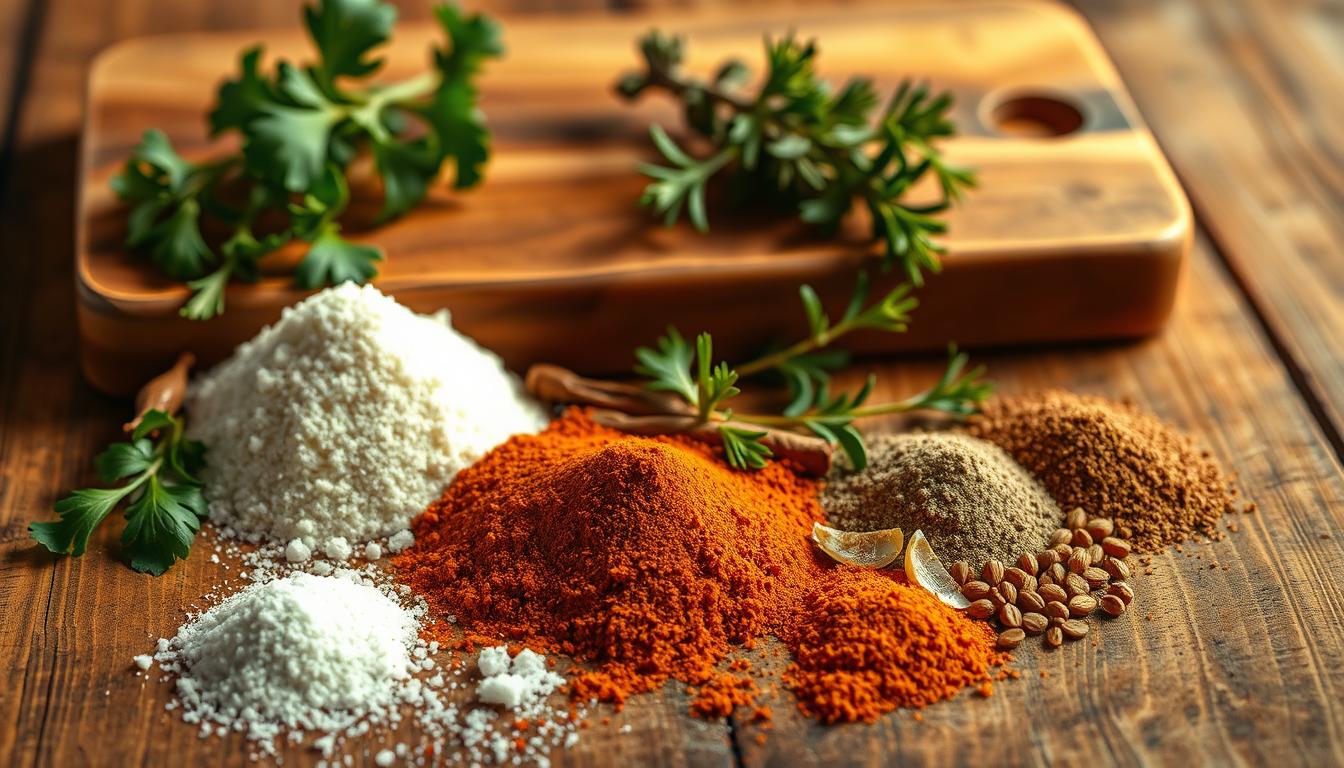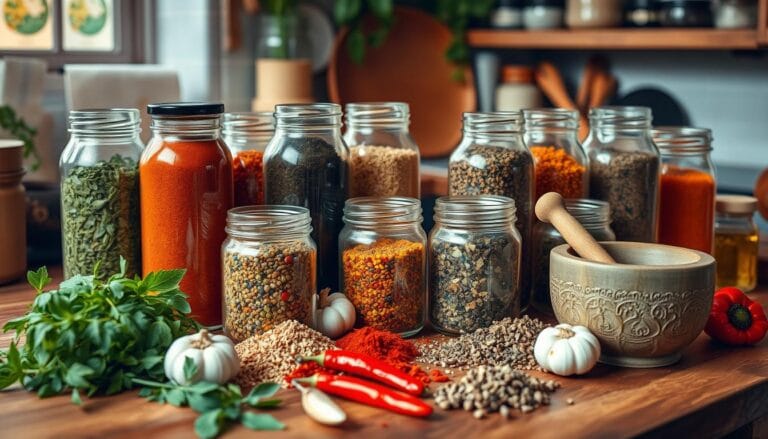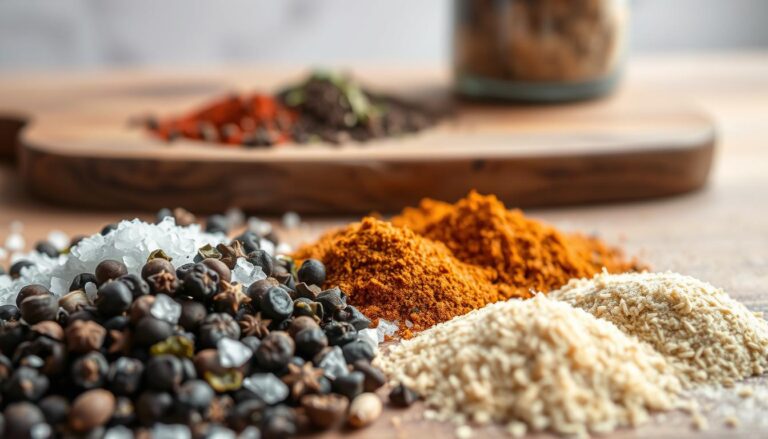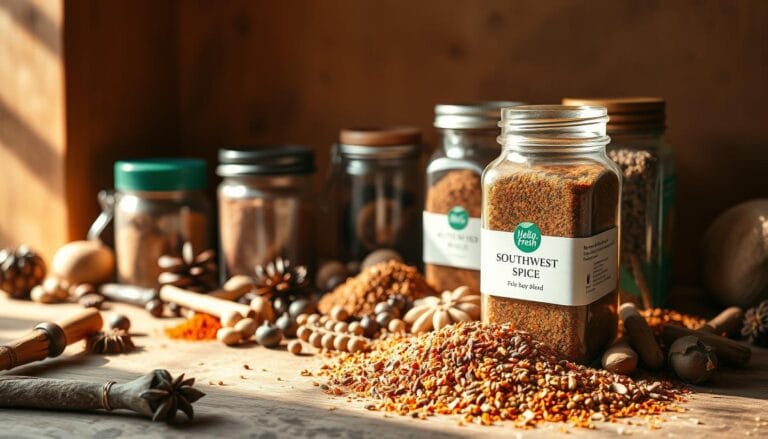Discover the best spices for chicken for Delicious Chicken
Are you tired of cooking chicken that’s bland and unappetizing? Do you struggle to find the right seasoning to elevate your meals?
Transforming an ordinary chicken dish into an extraordinary one is easier than you think. The key lies in understanding the art of seasoning and using the right combination of spices to bring out the desired flavor.
With the right techniques and seasoning combinations, you can create a variety of mouth-watering dishes that will impress your family and friends. In this comprehensive guide, we’ll explore the best spices for chicken and help you discover your perfect match.
Key Takeaways
- Learn the art of seasoning chicken to create extraordinary meals.
- Understand how to elevate chicken dishes with the right spice combinations.
- Discover your perfect chicken seasoning match.
- Expand your culinary repertoire with various flavor profiles.
- Impress your family and friends with your new cooking skills.
Why Seasoning Makes All the Difference in Chicken Dishes
The true potential of chicken as a culinary canvas is unlocked through effective seasoning. You can transform this versatile protein into a myriad of delicious dishes by applying the right blend of herbs and spices.

The Versatility of Chicken as a Culinary Canvas
Chicken is renowned for its neutral, mild flavor profile, making it an ideal base for a wide array of culinary creations. Its mild taste allows it to absorb and highlight the characteristics of various herbs and spices, rendering it a perfect protein to showcase different seasonings.
How Proper Seasoning Transforms Ordinary Chicken
Proper seasoning is the key to transforming ordinary chicken into an extraordinary dish. By understanding how seasonings penetrate the meat and enhance its natural flavors, you can create memorable culinary experiences.
The Best Spices for Chicken: Essential Flavor Builders
The art of seasoning chicken involves a delicate balance of herbs and spices that enhance its natural flavor. To achieve this balance, it’s crucial to understand the role of various spices and how they contribute to the overall flavor profile.
Salt and Pepper: The Foundation of Flavor
Salt and pepper form the essential foundation for any chicken seasoning blend. They enhance the natural flavors of the chicken, creating a savory taste experience.
Garlic and Onion Powders: Aromatic Depth
Garlic powder and onion powder add aromatic depth to chicken dishes, complementing its natural flavors. These powders are strong aromatics that enhance the overall flavor profile.
Paprika: Color and Mild Sweetness
Paprika adds color and a mild sweetness to chicken dishes. It comes in various forms, including smoked, hot, or mild, allowing for versatility in different recipes.
Dried Herbs: Oregano, Thyme, and Rosemary
Dried herbs like oregano, thyme, and rosemary add complex flavor profiles to chicken. They provide aromatic notes that enhance the overall taste experience.
Heat Elements: Cayenne, Black Pepper, and Chili Powders
Heat elements like cayenne, black pepper, and chili powders can be adjusted to personal preference, adding a spicy kick to chicken dishes.
Global Herb and Spice Combinations for Chicken
Exploring global cuisines reveals a diverse array of herb and spice combinations that elevate chicken dishes. Different cultures have their unique blends that not only flavor chicken but also reflect their culinary traditions.
Mediterranean Herb Blends
Mediterranean cuisine is known for its liberal use of herbs like oregano, rosemary, and thyme. These herbs, often combined with garlic and lemon, create a classic flavor profile for chicken dishes that is both aromatic and savory.
Mexican and Latin American Spice Profiles
Mexican and Latin American cuisines are characterized by bold flavors, with cumin, chili peppers, and cilantro being staples. These ingredients add a vibrant, spicy flavor to chicken, making it a staple in dishes like tacos and grilled chicken.
Asian-Inspired Seasoning Combinations
Asian cuisines offer a wide range of seasoning combinations, from Chinese five-spice to Thai curry blends. These combinations often include ingredients like ginger, lemongrass, and turmeric, providing a complex and aromatic flavor to chicken.
Middle Eastern Spice Blends
Middle Eastern cuisine is renowned for its rich spice blends, such as za’atar and baharat. These blends, featuring spices like cardamom, cinnamon, and sumac, add a warm, aromatic flavor to chicken dishes.
| Region | Key Herbs/Spices | Flavor Profile |
|---|---|---|
| Mediterranean | Oregano, Rosemary, Thyme | Aromatic, Savory |
| Mexican/Latin American | Cumin, Chili Peppers, Cilantro | Bold, Spicy |
| Asian | Ginger, Lemongrass, Turmeric | Complex, Aromatic |
| Middle Eastern | Cardamom, Cinnamon, Sumac | Warm, Aromatic |
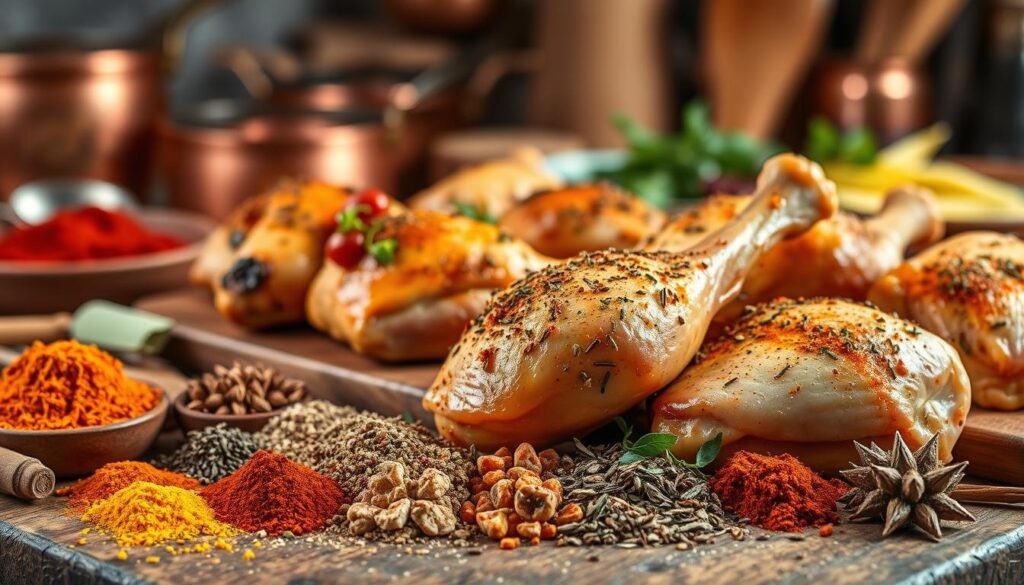
3 Homemade Chicken Seasoning Blends to Try
Transform your chicken recipes with these simple yet delicious homemade chicken seasoning blends. Creating your own spice blends allows you to customize flavors to your liking and ensures you always have a ready supply on hand.
All-Purpose Chicken Seasoning
This versatile blend is perfect for any chicken dish. Mix together 2 tablespoons of lemon pepper seasoning, 1 tablespoon of salt, 1 tablespoon of garlic powder, 1 tablespoon of onion powder, 1 tablespoon of paprika, and 1 teaspoon of dried dill. This blend provides a balanced flavor that works well with grilling, baking, or sautéing.
Mexican-Style Chicken Seasoning
Add a spicy kick to your chicken with this Mexican-inspired blend. Combine 2 tablespoons of ancho chile powder, 1 tablespoon of salt, 1 tablespoon of garlic powder, 1 tablespoon of onion powder, 1 teaspoon of ground cumin, 1 teaspoon of dried oregano, and 1/2 teaspoon of cayenne pepper. This blend is ideal for grilled or roasted chicken.
Italian Herb Chicken Seasoning
For a more aromatic flavor, try this Italian herb blend. Mix 2 tablespoons of Italian seasoning (containing rosemary, thyme, basil, and oregano), 1 tablespoon of salt, 1 tablespoon of garlic powder, 1 tablespoon of onion powder, and 1/2 teaspoon of crushed red pepper flakes. This blend is perfect for baked or grilled chicken.
| Seasoning Blend | Key Ingredients | Best Cooking Method |
|---|---|---|
| All-Purpose | Lemon pepper, garlic powder, paprika | Grilling, baking |
| Mexican-Style | Ancho chile powder, cumin, cayenne pepper | Grilling, roasting |
| Italian Herb | Italian seasoning, garlic powder, crushed red pepper | Baking, grilling |
How to Properly Season Chicken for Maximum Flavor
Properly seasoning your chicken can elevate it from ordinary to extraordinary. The process involves a few key steps that ensure your chicken is flavorful and delicious.
Dry Rub Techniques
To start, pat your chicken dry with a paper towel to remove excess moisture. This helps the seasoning adhere to the meat more effectively. Then, sprinkle your chosen seasoning blend evenly over the chicken, gently rubbing it into the meat to ensure coverage.
Marinating Methods and Times
Marinating is another effective way to infuse flavor into your chicken. The process involves soaking the chicken in a mixture that typically includes acids (like vinegar or lemon juice), oils, and spices. The marinating time can vary depending on the cut of chicken; for example, boneless breasts may require 30 minutes to 2 hours, while tougher cuts like thighs can benefit from longer marinating times.
Seasoning Under the Skin
For bone-in chicken pieces, seasoning under the skin can add deeper flavor. Gently loosen the skin and rub the seasoning directly onto the meat. This technique allows the flavors to penetrate more effectively, resulting in a more delicious final dish.
| Technique | Description | Benefits |
|---|---|---|
| Dry Rub | Applying seasoning directly to the meat | Enhances flavor, easy to apply |
| Marinating | Soaking in a flavored liquid | Tenderizes, adds deep flavor |
| Under the Skin | Rubbing seasoning under the skin | Intense flavor, moist meat |
By incorporating these techniques into your cooking routine, you can significantly improve the flavor of your chicken dishes. Whether you’re using a dry rub, marinating, or seasoning under the skin, the key is to allow the flavors to meld together for at least 15 minutes to 2 hours before cooking.
Cooking Methods for Perfectly Seasoned Chicken
To elevate your chicken dishes, it’s crucial to master various cooking methods that complement your seasoning choices. Different cooking techniques can significantly impact how the flavors of your seasonings are brought out in the final dish.
Grilling Seasoned Chicken
Grilling adds a smoky flavor to your chicken. Preheat your grill to medium heat (350-400°F). For boneless chicken pieces, cook for 4-6 minutes per side, and for bone-in pieces, cook for 12-15 minutes per side. Ensure the internal temperature reaches 165°F for safe consumption.
Oven-Baking with Spices
Oven-baking allows spices to form a flavorful crust on the chicken while keeping it juicy inside. Preheat your oven to 400°F for boneless chicken or 425°F for bone-in chicken. Cook boneless pieces for 20-25 minutes and bone-in pieces for 40-45 minutes, ensuring they reach 165°F internally.
Pan-Frying and Sautéing Techniques
Pan-frying and sautéing are excellent for achieving a crispy exterior and a tender interior. Use medium-high heat and a small amount of oil to prevent spices from burning. Cook until the chicken reaches 165°F internally.
| Cooking Method | Chicken Type | Temperature | Cooking Time |
|---|---|---|---|
| Grilling | Boneless | 350-400°F | 4-6 minutes/side |
| Grilling | Bone-in | 350-400°F | 12-15 minutes/side |
| Oven-Baking | Boneless | 400°F | 20-25 minutes |
| Oven-Baking | Bone-in | 425°F | 40-45 minutes |
Storing and Preserving Your Homemade Spice Blends
To keep your homemade spice blends fresh, it’s essential to store them correctly. Proper storage maintains the flavor and potency of your blends, ensuring they remain effective in your cooking.
Proper Containers and Storage Conditions
Store your chicken spice mix in a clean, airtight container in a cool, dark, dry location. Glass jars and metal tins are ideal options. Avoid exposure to heat, light, and moisture, as these factors can cause your spice blend to lose its flavor and aroma.
Shelf Life and Freshness Tips
A spice mix will only keep for as long as your oldest herb or spice allows. Typically, chicken seasoning will keep for 4-6 months, retaining its freshness and flavor. Before using, give your jar of seasoning a good shake to dislodge any mix that might have gotten stuck together.
| Storage Method | Shelf Life | Tips |
|---|---|---|
| Airtight Container | 4-6 months | Keep in a cool, dark place |
| Glass Jar | 4-6 months | Avoid direct sunlight |
| Metal Tin | 4-6 months | Keep away from heat sources |
By storing your homemade spice blends correctly, you can enjoy flavorful and aromatic dishes for a longer period. Regularly check your spice blends for any signs of losing potency and replace them as needed.
Common Seasoning Mistakes to Avoid
To achieve that perfect blend of flavors in your chicken dishes, it’s crucial to steer clear of common seasoning pitfalls. Seasoning is not just about adding flavor; it’s about enhancing the natural taste of the chicken without overpowering it.
Overseasoning vs. Underseasoning
One of the most common mistakes is the imbalance between overseasoning and underseasoning. Using too little seasoning can result in bland chicken, while too much can overwhelm its natural flavor. A general rule of thumb is to use 1 tablespoon of seasoning mix per pound of chicken, but this can be adjusted according to personal preference.
Timing Issues When Adding Spices
The timing of when you add spices can significantly affect their performance. Some seasonings, like paprika and dried herbs, are best added early in the cooking process to allow their flavors to meld with the chicken. In contrast, delicate spices like fresh herbs and citrus zest should be added towards the end to preserve their potency.
Balancing Flavors Effectively
Balancing different flavor profiles is crucial. A well-seasoned chicken dish should have a mix of salty, sweet, sour, bitter, and umami flavors. For instance, if you’re using a lot of pepper or cayenne for heat, balance it out with a squeeze of fresh lemon juice for a sour note.
| Common Mistake | Effect on Flavor | Correction |
|---|---|---|
| Overseasoning | Overwhelms the chicken’s natural flavor | Reduce the amount of seasoning mix |
| Underseasoning | Results in bland taste | Increase seasoning gradually to taste |
| Poor Timing | Can lead to under or overpowering flavors | Add spices at appropriate cooking stages |
Conclusion: Elevate Your Chicken Dishes with the Right Spices
By mastering the use of spices, you’ll unlock a world of flavors for your chicken dishes. Proper seasoning transforms ordinary chicken into extraordinary meals. Experiment with different spice combinations to discover your personal preferences and expand your culinary repertoire.
The best chicken dishes balance seasoning with the natural qualities of the meat. With the right techniques and a bit of creativity, you can make chicken the star of any meal. Continue exploring global flavor profiles to keep your dishes exciting and varied, and enjoy the journey of creating delicious, mouth-watering chicken meals.

